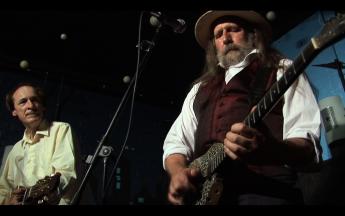Search
Rychard Carrington reports on John Otway and Wild Willy Barrett – The Junction, Cambridge, 10 September 2009

Otway and Barrett are two unique performers, who enjoy/suffer from a unique relationship. So that's a triple dose of uniqueness in one act. For this tour, they've labelled themselves 'The Incompatible Otway and Barrett'. To what extent are they opposites, to what extent are they really kindred spirits? One could write a lengthy dissertation on this subject. There's no need for such analysis, of course, but for anyone who likes quirkiness of a very unsmug nature, who prefers original character to slickness, Otway and Barrett are as compelling a live act as any in the country.
While Otway so loves being popular, Barrett appears utterly indifferent to applause, even disdainful. Much of the humour of the act is based around this tension. Barrett shakes his head in knowing disagreement with nearly everything Otway says. Referring to Really Free's appearance at number 27 in the charts, in 1977, Otway boasts, with childlike glee, 'we've been pop stars for thirty-two years'. 'I never wanted to be a pop star' retorts Barrett, 'I wanted to be an enigma'. There are nicely contrasting ironies: when Otway punches the air, he presents himself as someone who really knows he will always feel like an amateur playing at being a star (thus he's really self-deprecating underneath). When Barrett follows suit, he sends up an aspiration he finds ridiculous, just through the way his arm moves, and the look of boredom and resigned contempt on his face.
Over the years, both Otway and Barrett have naturally acquired new idiosyncracies: in terms of instruments, Otway has taken up the theremin, while Barrett does curious things with an amp hidden inside a wheelie bin. Both additions are incorporated into the repertoire in a way that ups the clowning yet strangely enhances the musical quality. A number described by Barrett as an eighteenth-century duet for guitar and theremin was something of a musical treasure, while on the sentimental ballad 'Geneve' Barrett switched from sensitive guitar accompaniment to rhythmically destroying his guitar with saw and hammer, finally switching to bagpipes.
Yet it's not just tomfoolery, or even personal charm, that makes their act special: for all the self-mockery (of Otway by Otway, and of Otway by Barrett) they actually play good music. With Barrett this is more obvious: he clearly is an excellent, inventive and versatile musician. With Otway the quality is harder to identify. Yet however quirkily he articulates it, there's a passion and a tenderness in his vocals and in his lyrics. The songs aren't smooth but they are heartfelt. Otway's instinctive originality steers him clear of cliché, to convey romantic sentiments in a way that never fails to be interesting. Curiosities abound, one's that you would never find in Robbie Williams numbers: 'Baby they all said that it was me, that went out in the nude'; 'Your Ma is singing on the telly', 'Look out, Princes Risborough, I'm back'. Otway expresses himself through details others might regard as incidental, as in '21 Days':
one million eight hundred and fourteen thousand
four hundred seconds
thirty thousand two hundred and forty minutes.
five hundred and four hours to go,
yeah, twenty-one days goes so slow
There's no one like Otway. Not even/least of all Barrett. And vice versa, of course.
Writer: Rychard Carrington